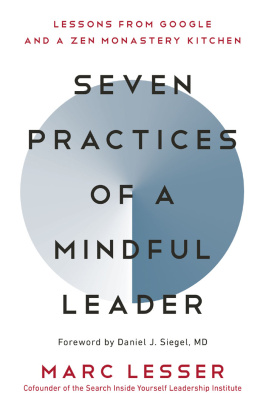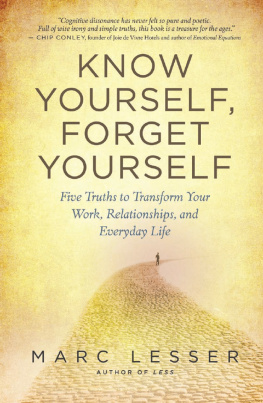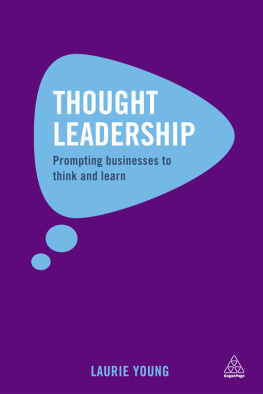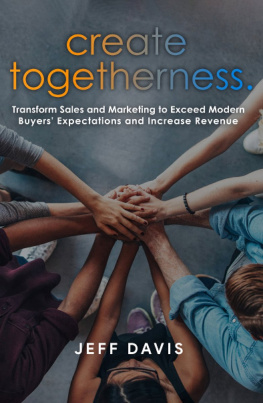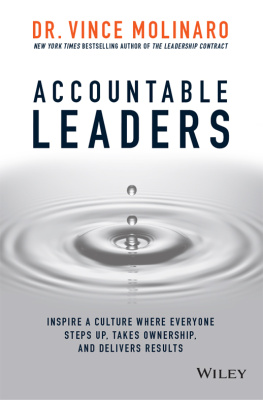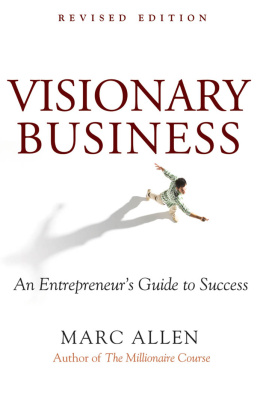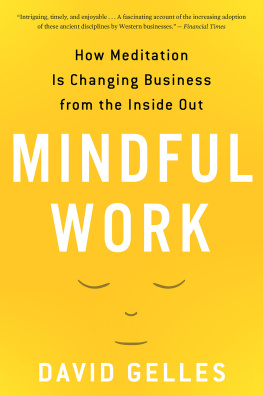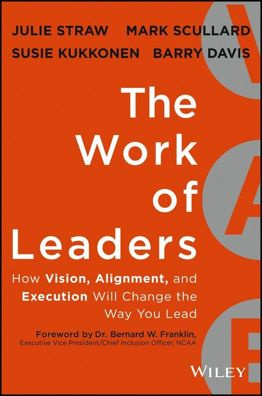D epend on others is . Ive depended on others for every part of this book during my time in the Tassajara kitchen, leading trainings at Google, as CEO of the Search Inside Yourself Leadership Institute, and including the full spectrum of my work and life, all of which has been poured into this effort.
Ill start with my years in the Tassajara kitchen. During my first summer as dishwasher, Steve Weintraub supported me in his role as head cook. During my first winter, Dana Dantine was the head cook and asked me to be on the kitchen crew and then to be the summer baker. A few years later I was assistant to the head cook while Teah Strozer ran the kitchen, and the following year when I was head cook, Gil Fronsdale was the assistant. While working in the kitchen, I learned a good deal from Meg Alexander, Chris Fortin, Richard Jaffe, Michael Gelfond, Karin Gjording, Annie Sommerville, and many others cooking, baking, and practicing together.
Thank you to Mike Dixon for first bringing me into Google. You had no idea of the doors you opened. And to Chade-Meng Tan for inviting me to be part of the original Search Inside Yourself team. Punit Aggarwal, Dolores Bernardo, Hemant Bhanoo, Sudhakar Chandra, Bill Duane, Mario Galarreta, Jenny Lykken, Karen May, Liz Olson, Van Riper, Paul Santagata, Ruchika Sikri, and many others supported me at Google. Philippe Goldins mentoring was invaluable.
Thank you to my Search Inside Yourself Leadership Institute colleagues, especially Kimiko Bokura, Peter Bonanno, Peter Bostelmann, Laurie Cameron, Mark Coleman, Linda Curtis, Rick Echler, Ilana Robbins Gross, Judith Harris, Caro Hart, Lindsey Kugel, Meg Levie, Nina Levit, Michelle Maldonado, Simon Moyes, Alex Moyle, Tyler Peterson, Brandon Rennels, Jason Sbordone, Lori Schwanbeck, Stephanie Stern, Peter Weng, and Regina Zasadzinski. And to the Search Inside Yourself community.
Much appreciation to Norman Fischer, good friend and esteemed dharma teacher for your creativity and wisdom, and for bringing forth these seven practices. To Michael Wenger, my other root teacher, and to friend and teacher Paul Haller.
Thanks to my Social Venture Network Peer Circle for ongoing leadership support: Judi Cohen, Jay Harris, Elliot Hoffman, Aaron Lamstein, David Leventhal, Jared Levy, and Jill Portman.
Thanks to my Old Zen Guys for keeping my practice alive: Marc Alexander, Bruce Fortin, Michael Gelfond, Rick Levine, Ken Sawyer, Peter Van der Sterre, and Steve Weintraub.
Thank you to the leadership team of Mill Valley Zen: Judith James, Karen Lang, Loretta Lowrey, David Maxwell, and Dharna Obermaier for keeping it all together.
I appreciate my ongoing leadership and life conversations with Mitch Anthony, Deborah Berman, Martin Berman, Debra Dunn, Daniel Ellenberg, Bruce Feldman, Lori Hanau, Rick Hanson, Roger Housden, Craig Litman, Jackie McGrath, Richard Miller, Deborah Nelson, Dan Siegel, Lucinda Rhys, Peter Strugatz, and David Yeung.
Thank you to Jason Gardner of New World Library for believing in me and this book project through its many transitions and transformations. And much appreciation to Monique Muhlenkamp, Munro Magruder, and the New World Library team for terrific support.
Thank you to Jennifer Futernick for your early work in helping to shape this book.
I appreciate the writing feedback from Krista de Castella, Robyn Morris, Roger Asleson, Jay Harris, Vanessa Meade, Wendy Quan, Tina de Salvo, and Kelly Werner.
Thank you to Jeff Campbell, editor extraordinaire and thought partner, for pushing, pulling, and guiding me all along the way.
Doing bows of appreciation to my wife, Lee, for her relentless, wholehearted love, honesty, and support. And to my children, Jason and Carol, for enriching my life and helping me to keep my heart open.
Deep appreciation to my mother and father, Beatrice and Ralph Lesser, for providing unconditional love.
ALSO BY MARC LESSER
Know Yourself, Forget Yourself
Less
Z.B.A. Zen of Business Administration
M arc Lesser is CEO of ZBA Associates, a company providing mindfulness-based leadership trainings, executive coaching, and keynote talks. He has led trainings at many of the worlds leading businesses and organizations, including Google, SAP, Genentech, and Kaiser. He is the cofounder and former CEO of the Search Inside Yourself Leadership Institute, based on a program he helped develop within Google.
Marc was a resident of the San Francisco Zen Center for ten years and former director of Tassajara Zen Mountain Center, and he currently leads Mill Valley Zen, a weekly meditation group. Marc has an MBA degree from New York University and is the author of Z.B.A. Zen of Business Administration, Less, and Know Yourself, Forget Yourself.
T his recommended reading section combines books on leadership, mindfulness, science, the humanities, and an occasional novel. What connects them is the attempt to make sense of human beings and the world we live in. These are among the books I find myself regularly suggesting to my friends and clients:
Burdick, Alan. Why Time Flies: A Mostly Scientific Investigation. New York: Simon & Schuster, 2017.
DAnsembourg, Thomas. Being Genuine: Stop Being Nice, Start Being Real. Encinitas, CA: PuddleDancer Press, 2007.
Goleman, Daniel, and Richard Davidson. Altered Traits: Science Reveals How Meditation Changes Your Mind, Brain, and Body. New York: Avery, 2017.
Hanson, Rick, and Forrest Hanson. Resilient: How to Grow an Unshakable Core of Calm, Strength, and Happiness. New York: Harmony, 2018.
Harari, Yuval Noah. Sapiens: A Brief History of Humankind. New York: HarperCollins, 2015.
_______. Homo Deus: A Brief History of Tomorrow. New York: HarperCollins, 2017.
Hougaard, Rasmus, and Jacqueline Carter. The Mind of the Leader: How to Lead Yourself, Your People, and Your Organization for Extraordinary Results. Boston: Harvard Business Review Press, 2018.
Kahane, Adam. Power and Love: A Theory and Practice of Social Change. San Francisco: Berrett-Koehler Publishers, 2010.
Kahneman, Daniel. Thinking Fast and Slow. New York: Farrar, Straus and Giroux, 2011.
McCullough, David. The Wright Brothers. New York: Simon & Schuster, 2015.
Ostaseski, Frank. The Five Invitations: Discovering What Death Can Teach Us About Living Fully. New York: Flatiron Books, 2017.
Ozeki, Ruth. A Tale for the Time Being: A Novel. New York: Penguin Books, 2013.
Pinker, Steven. Enlightenment Now: The Case for Reason, Science, Humanism, and Progress. New York: Viking, 2018.
Pollan, Michael. How To Change Your Mind: What the New Science of Psychedelics Teaches Us About Consciousness, Dying, Addiction, Depression, and Transcendence. New York: Penguin Press, 2018.
Siegel, Daniel. Aware: The Science and Practice of Presence. New York: TarcherPerigee, 2018.
Sinek, Simon. Leaders Eat Last: Why Some Teams Pull Together and Others Dont. New York: Portfolio/Penguin, 2014.
Senge, Peter. The Fifth Discipline: The Art & Practice of the Learning Organization. New York: Currency/Doubleday, 1990.
Suzuki, Shunryu. Zen Mind, Beginners Mind: Informal Talks on Zen Meditation and Practice. Boston: Shambhala, 2006.
Van der Kolk, Bessel. The Body Keeps the Score: Brain, Mind, and Body in the Healing of Trauma. New York: Penguin Books, 2015.
Wright, Robert. Why Buddhism Is True: The Science and Philosophy of Meditation and Enlightenment. New York: Simon & Schuster, 2017.
Love is the quality of attention we pay to things.
J. D. M C C LATCHY
O ne of the first times that I co-led a Search Inside Yourself training at Google headquarters in Mountain View, we had participants practice what we call mindful listening where one person speaks and the other person just listens, without asking questions or interrupting. This is a way of taking the awareness involved in meditation practice into engaging with another person. Just listening, with your full attention, can be a great gift and an important skill in cultivating healthy communication. Whenever I instruct participants, I suggest that the person speaking experiment by being willing to risk not knowing what you will say; perhaps even surprise yourself by what you say. Taking turns, each speaker is to address or answer two questions: What brings you here today? And what really brings you here today? Each person gets a few minutes to speak, and then as a group we take several minutes to debrief the exercise, to discuss how it feels to just listen and to speak without interruption.
Next page
